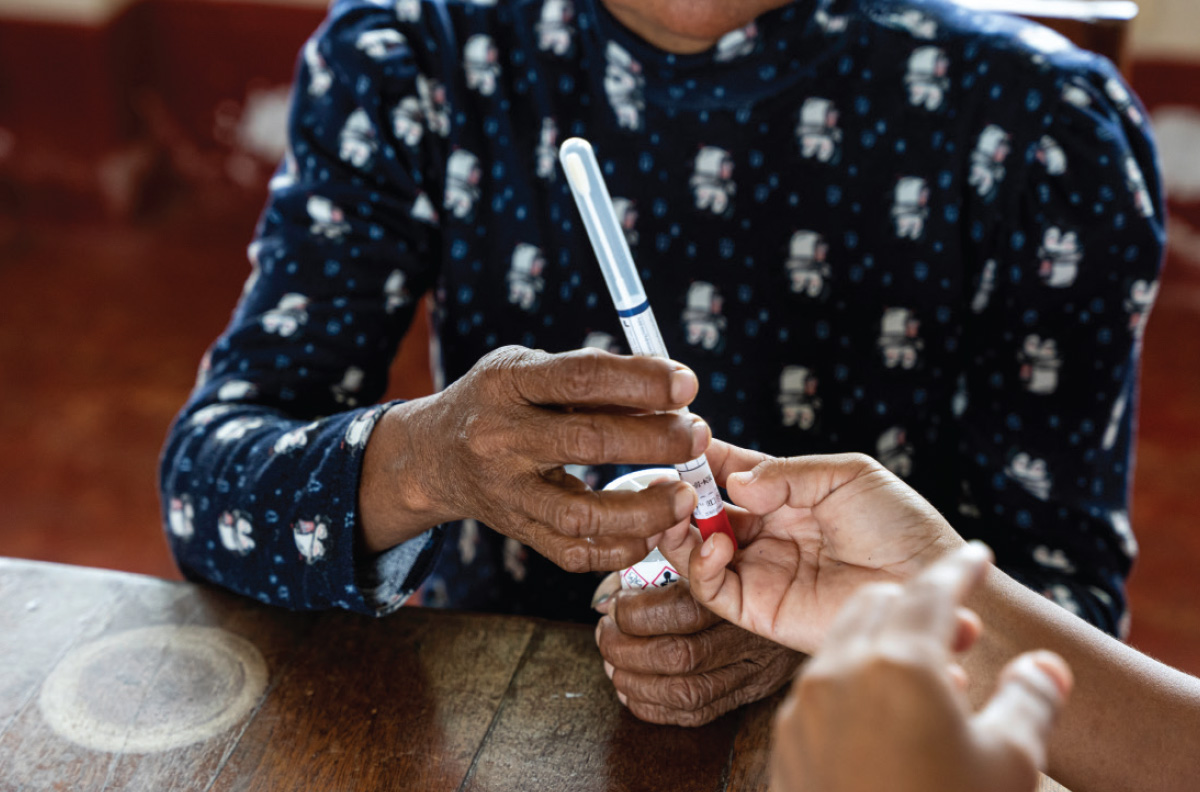
Roche Test Reaches Remote Communities
Cervical Cancer Target of Local Company
By Gabrielle Fimbres – Special to BizTucson
Rosana Maldonado steered her tiny motorboat down the expansive Perúvian Amazon River on a journey to protect herself against cervical cancer. This mother and yuca farmer made the two-hour trek to Comunidad El Salvador, a village of 450 residents in Perú’s Amazon rainforest, with no electricity or running water.
Rosana was one of dozens of women who met at the village “tambo,” a traditional Incan word for gathering place, to share conversation and an opportunity to take part in a new approach to screening for an infection that causes nearly all cases of cervical cancer.
Cervical cancer kills six women every day in Perú, more than any other type of cancer. Change is desperately needed.
“It’s important that we get tested, for our families and ourselves,” said Rosana, who heard about the screening event on her radio as she rose before the sun to tend to her family and her farm.
Innovation developed by Roche Tissue Diagnostics in Oro Valley is empowering women like Rosana, who live in some of the most remote communities in the world, to collect their own vaginal samples to be tested for HPV − or human papillomavirus. Self-collection with a simple cotton swab can help break down barriers that prevent women and people with a cervix from being screened for HPV.
Rosana is among 300,000 Perúvian women to be tested through a collaborative effort between the Perúvian Ministry of Health, government organizations, patient advocates and other groups including Roche, with HPV self-collection as the primary strategy to expand access. Through the program, Roche has trained 7,500 Perúvian healthcare workers and collaborated with the Ministry of Health to improve care for high-risk HPV-positive patients.
“Globally, hundreds of thousands of women die unnecessarily from cervical cancer because they weren’t screened in time,” said Jill German, head of Roche Tissue Diagnostics located in Oro Valley.
“It’s our responsibility to work together to create opportunities like this one in Perú, to support health systems in addressing gaps in care to defeat this highly preventable disease,” she continued. “By giving control back to women to protect their own health, we can reach more mothers, sisters, daughters and friends in some of the most remote communities of the world.”
Roche’s self-collection innovation, which was launched in countries outside of the United States in 2022, is among the latest innovations aimed at enabling healthcare organizations to improve cervical cancer prevention.
During the 1980s, the link between HPV infection and cervical cancer was discovered, paving the way for the creation of HPV vaccines and new screening tests. Roche has added next-generation, biomarker-based diagnostic tools that detect high-risk HPV infections and identify precancerous changes where intervention can prevent cancer from developing.
So how can a simple cotton swab help prevent cervical cancer in a remote village along the Amazon?
As a tool in Roche’s cervical cancer testing portfolio, this long cotton swab is used by women to collect a vaginal sample. No internal examination by a physician or nurse, which can be uncomfortable and embarrassing, is required. All that is required from a healthcare provider is instruction on how to correctly collect a sample.
Midwives from the Perúvian Ministry of Health made the four-hour boat journey from the nearest city of Iquitos to demonstrate to Rosana and her neighbors how to privately collect their own vaginal samples on a swab in a tube.
Following the event, the midwives loaded the vaginal samples from Rosana and others that had been placed in a collection medium ready for transportation back onto their boat to be delivered to Iquitos for diagnostic testing with the Roche HPV test. When high-risk HPV is detected, healthcare providers return to the village to provide treatment.
“Moms sometimes don’t do the exams out of fear, the shame that we previously had with Pap tests,” said Menesolita Fernandez, a community health agent in Comunidad El Salvador who talks to neighbors about the importance of screening, as well as HPV vaccines for their children.
“In this case I see it is more feasible now that it can be done privately. Women are more comfortable with this approach.”
Women in Perú have been eager to participate in self-collection. More than 80% of women in the pilot program have chosen self-collection over having a healthcare provider collect their sample. This collaboration represents a potential model for other countries grappling with similar healthcare challenges, underscoring the importance of accessibility, education and empowerment in disease prevention.
“This was my first time showing women how to take their own sample, and they were very happy, and felt so comfortable,” said Perúvian midwife Tiffany Cordova Samplini, who worked 1-on-1 with women to show them how to collect their own sample. “With self-collection you are able to impact many more people.”
For moms like Rosana, this program isn’t just about preventing disease. It represents a stronger future for their families and a lasting change in their communities.
“It really went well for me,” Rosana said of collecting her own vaginal sample. “I feel content and happy to be able to carry the message to the other mothers so that they have these tests. It’s so important for us.”
Gabrielle Fimbres is senior communications manager for Roche Diagnostics and a former editor and writer for BizTucson.
Travel from Ceredigion, Wales, to Comunidad El Salvador in the heart of the Perúvian Amazon to learn more about how HPV self-collection is empowering women to protect themselves against cervical cancer. This video was produced for Roche by BBC StoryWorks.





